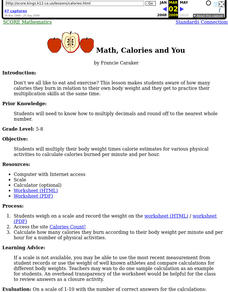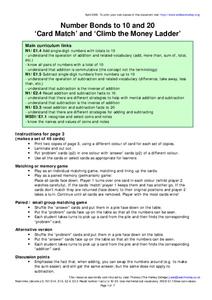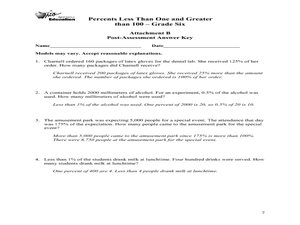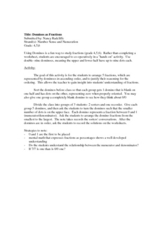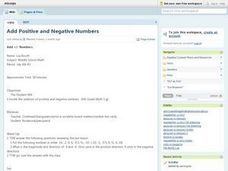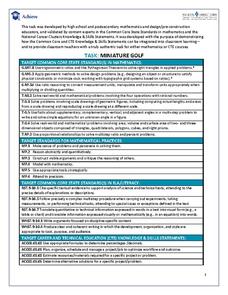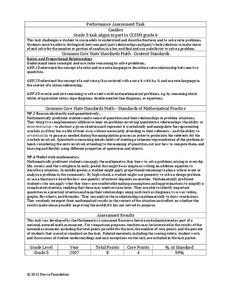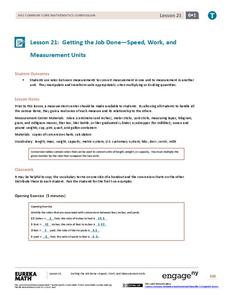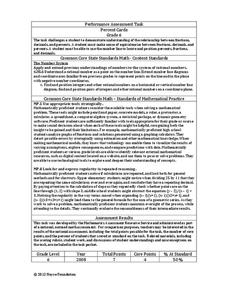Rational Number Project
Initial Fraction Ideas: Lesson 3
Visual models support young mathematicians as they deepen their fractional number sense in this elementary math lesson plan. Using fraction circle manipulatives, children explore basic unit fractions as they develop the...
Yummy Math
Sweethearts Candy
Sweethearts® candies are a beloved Valentine's Day treat—so much so that eight billion hearts are produced every year around the world! Learners use number sense reasoning and critical thinking to solve nine word problems about the...
Illustrative Mathematics
Running to School, Variation 2
Rose's commute to school is a fractional distance. After she runs part of the way, your class needs to determine what fractional distance she ran. This problem explores fraction operations through modeling and computation. The...
Illustrative Mathematics
Making Cookies
Hooray for chocolate chip cookies! Ask your mathematicians to triple a chocolate chip cookie recipe and then reduce the recipe by one-fourth. Your class may need two days to complete, tripling the recipe the first day and reducing the...
Curated OER
Number Sense Worksheet
In this number sense worksheet, students find numbers that are between fractions, complete subtraction problems, complete multiplication problems and more. Students complete 6 problems.
Curated OER
Problem Solving: Use a Number Line
In this number line worksheet, students use a number line to solve six problems about temperature change. They explain why their answers make sense.
Noyce Foundation
Granny’s Balloon Trip
Take flight with a fun activity focused on graphing data on a coordinate plane. As learners study the data for Granny's hot-air balloon trip, including the time of day and the distance of the balloon from the ground, they practice...
EngageNY
Creating Division Stories
Create your own adventure story ... well, not really. The fifth lesson in a 21-part series has pairs create story contexts for division problems. The lesson presents a step-by-step process for pupils to follow in writing such stories.
Curated OER
Calculator Tricks: The Golden Prediction
Excite the class with a mathematical trick, a calculator, and a good number sense. They use the directions provided on each slide to make a list of numbers, use their calculator to divide, and find the golden mean. A little history on...
Curated OER
Math, Calories and You
Discover the connection between calories and weight. Pupils multiply their body weight times calorie estimates for various physical activities to calculate calories burned per minute and per hour. Worksheets a well as website links are...
Curated OER
Number Bonds To 10 And 20
In this number bonds to ten and twenty worksheet, students working in pairs begin to read the instructions to and play the two games 'Card Match' and 'Climb the Money Ladder'.
Curated OER
Percents Less Than One and Greater Than 100
Sixth graders express numbers as percents greater than 100 and less than one. In this lesson on percents, 6th graders work in groups with real life scenarios to develop an understanding on percentages greater than 100 and less than one....
Curated OER
Dominos As Fractions
Students investigate the concept of using fractions in a variety of different contexts. They participate in a hands on activity in the stead of book work. The goal is to get them acquainted with the use of fractions using mental math...
Curated OER
Add Positive And Negative Numbers
Scholars investigate the concept of adding positive and negative numbers. They practice adding using the number line for scaffolding. This can be done as a game for younger learners, but may also be helpful for engaging the older pupils.
Curated OER
Math Prefixes
Young scholars use a dictionary to gather appropriate information for writing simple definitions. They recognize prefixes that relate to numbers, such as mono-, bi-, and tri-. Pupils use their creative abilities to extrapolate new words...
Curated OER
Task: Miniature Golf
"Fore!" All right, no one really yells this out in miniature golf, but this well-defined activity will have your charges using lots of numbers in their unique design of a miniature golf hole. Included in the activity criteria is the...
Noyce Foundation
Boxes
Teach your class to think outside the box. Scholars use the concept of equality to solve a problem in the assessment task. They determine how to use a scale to identify the one box out of a set of nine boxes that is heavier than the others.
Noyce Foundation
Ducklings
The class gets their mean and median all in a row with an assessment task that uses a population of ducklings to work with data displays and measures of central tendency. Pupils create a frequency chart and calculate the mean and median....
Noyce Foundation
Candy Fractions
While examining fractions and ratios, your leaners get to read about one of their favorite subjects: candy! There are four word problems on this activity. Learners consider situations in which "for every x caramels there are y...
Noyce Foundation
Truffles
Knowing how to scale a recipe is an important skill. Young mathematicians determine the amount of ingredients they need to make a certain number of truffles when given a recipe. They determine a relationship between ingredients given a...
Virginia Department of Education
Perfecting Squares
Here's a perfect way to introduce perfect squares. Individuals color in the diagonals of squares and record observations about patterns. They connect their diagrams to exponents of two and perfect squares.
Noyce Foundation
Photographs
Scaling needs to be picture perfect. Pupils use proportional reasoning to find the missing dimension of a photo. Class members determine the sizes of paper needed for two configurations of pictures in the short assessment task.
EngageNY
Getting the Job Done—Speed, Work, and Measurement Units
How do you convert from one measurement to another? Pupils use unit rates to convert measurements from one unit to another in the 21st segment in a 29-part series. They convert within the same system to solve length, capacity,...
Noyce Foundation
Percent Cards
Explore different representations of numbers. Scholars convert between fractions, decimals, and percents, and then use these conversions to plot the values on a horizontal number line.









